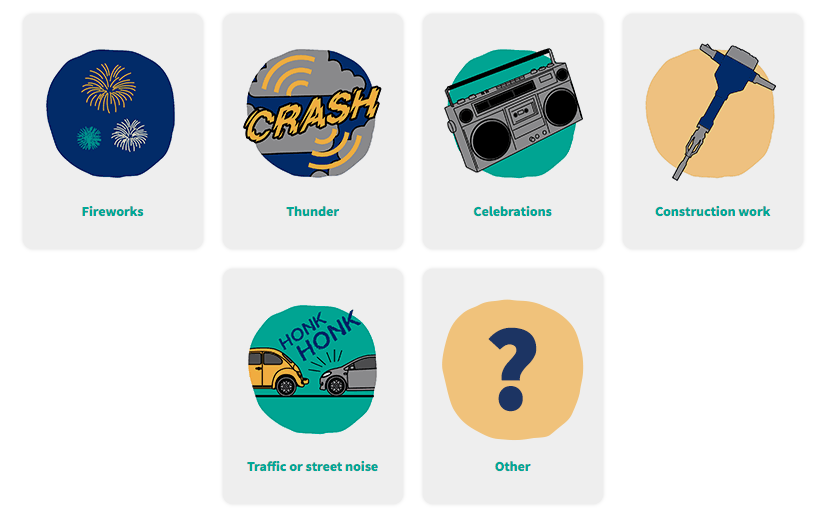What scares your pup?
Fireworks, Thunder, Celebrations, Construction work, Yard work, Cars, Buses, Other…
Dogs, like humans have more than one sense. One of the tools used to determine how to help a dog with fear or anxiety, is through identification of the sense that has caused that stress.
You may not think your dog is triggered by sound but everyday sounds you hear while walking, your fur baby will hear even more acutely than you.
Could it be a phobia, not just a fear?
A poorly understood condition, noise phobia can actually develop in dogs of all ages, although dogs over a year of age are more likely to suffer from it, according to Kristen Collins, a Certified Applied Animal Behaviorist (CAAB) and the director of the ASPCA's rehab center, which specializes in treating fearful and under-socialized dogs.
“Some dogs simply seem more sensitive and susceptible to developing a fear of noises, and this susceptibility may indicate a genetic predisposition toward the problem,” Collins explains.
Other dogs learn to fear certain sounds. “A dog who isn't initially afraid of a sound can become fearful when an unpleasant event is linked with that noise,” Collins adds.
What Noise Phobia Really Is (And Isn't)
Although they might all sound the same, fear, anxiety, and phobia are actually quite different.
“Fear is a physiologic, emotional, and behavioral response to animate or inanimate things that pose a threat of harm,” explains Stephanie Borns-Weil, DVM, and clinical instructor at Cummings School of Veterinary Medicine at Tufts University, where she's part of the Animal Behavior Clinic. “Fear is a normal reaction because it enables animals to respond to situations that could be potentially dangerous.”
Anxiety, on the other hand, is what Borns-Weil defines as a persistent fear or apprehension of something that is not present or imminent. And finally, there are phobias: extreme, persistent fears of a stimulus, such as a thunderstorm, that is entirely out of proportion to the level of threat it poses.
“Noise phobia is an extreme, persistent fear of auditory stimuli that is out of proportion to the real danger, if any, associated with the noise,” says Borns-Weil. “There is no survival advantage conferred on an animal that panics in response to things that are not truly threatening or dangerous.”
The symptoms of noise phobia are usually extreme.
A dog who's experiencing a phobia episode is panicking, so he'll pace, pant, tremble, and hyper salivate. Other indicators caused by the sound trigger:
Urinating or defecating
Hiding
Chewing
Panting
Pacing
Digging
Trying to escape
Drooling
Seeking comfort from family members
Barking
Trembling
Vomiting
For discrete sounds such as the vacuum cleaner, systematic desensitization and counterconditioning can be a very effective treatment. It involves the presentation of the frightening sound at a gradually increasing intensity, always making sure to stay below the threshold of intensity that would cause a fear response. The presentation of the sound is paired with a high value reward such as food, play, or petting.
Desensitization and counterconditioning doesn't work well for certain noise phobias, such as thunderstorm phobia, since storms are multi-sensory. For thunderstorm phobia, a dog can be taught to go to a “safe place” in the home. Or you can try using sights and sounds—white noise, relaxing music, light blocking shades—to shut out the storm as much as possible.
Whatever you do, never punish or reprimand your dog for being scared.
“Punishing a dog for destructiveness, barking, or soiling that is done out of panic will only increase anxiety and make the problem worse,” says Borns-Weil.
Desensitization and Counterconditioning not enough?
There are also natural calming agents which can help some pets, Composure chews, rescue remedy, and Adaptil collars are options that have worked for some dogs.
Finally, if all else fails, ask your veterinarian if there is a nutrient or medicine such as a sedative or an FDA approved treatment for noise aversion you can try along with managing the environment and behavior modification..
